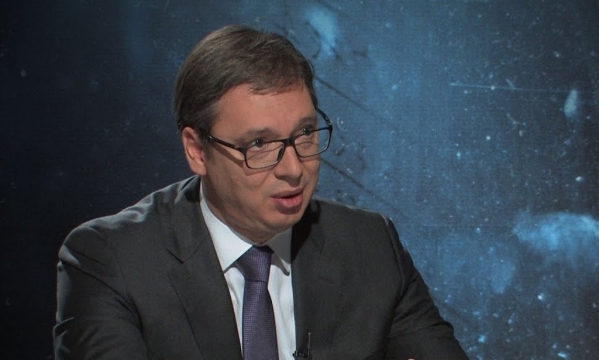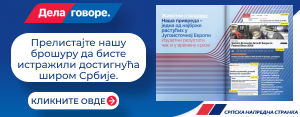
Vucic: Kosovo main 'hurdle' on Serbia's path to EU
Kosovo remains the major "hurdle" blocking Serbia's path to European Union membership, Serbian President Aleksandar Vucic said Monday, urging concessions from Pristina.
"The only big problem that I see as a real obstacle in our European path is the Kosovo issue", Vucic said, an ultra-nationalist turned pro-European, told AFP in an interview.
Serbia, which hopes to join the EU in 2025 at the same time as Montenegro, staunchly refuses to recognize Kosovo's 2008 declaration of independence and still considers the country as its southern province.
Kosovo and Serbia both aspire to join the European Union, but Brussels has made clear that is not going to happen until the former foes normalize relations with a legally binding agreement.
"After all it's all about Kosovo, whether we'll be able to do that or not," Vucic said, speaking in English.
"And of course it's more about Serbs but it's also about the other side and they have to get a very strong message from the EU and from the West that they need to make some concessions as well," he said.
Having launched negotiations under EU auspices in 2011, the two sides signed a deal five years ago in order to improve the every day lives of their citizens.
- Not ready for concessions -
However, their dialogue has been stuck since Pristina failed to allow the Serbian minority in Kosovo to form an association of municipalities where they hold a majority.
Vucic has been involved in that dialogue with Pristina since he became deputy prime minister in 2012, then prime minister two years later and president last year. He said Kosovo Albanians were not ready to make any concessions.
"They think that it is about time that Serbia recognized the full independence of Kosovo and that's it. They need to do nothing about Serbs, about Serbia, and they just need to wait.
"I'm not ready to speak in concrete terms but they need to make some concessions in the real term of the word. If they are ready we can reach something, if they are not ready that'll be very bad news for all of us," Vucic said.
- Pandora's box -
Serbian Foreign Minister Ivica Dacic is among those who have proposed an exchange of ethnic Albanian-populated southern Serbian territory with north Kosovo where Serbs are in a majority. However, Vucic has never publicly endorsed it. The idea has been branded as dangerous by the international community, but Vucic told AFP, "the most dangerous thing is to have a frozen conflict because one day someone might defreeze it."
"I'm listening the West saying that would be the worst solution because it will open a Pandora's box, but Western countries opened Pandora's box 10 years ago by recognizing Kosovo as an independent state."
Almost a decade after the 1998-1999 conflict that ended with NATO bombing Serbia and forcing its troops out of Kosovo, Pristina declared independence. It was recognized by more than 110 states, including the United States and most EU member states, but not Serbia's traditional ally Russia.
However, the EU itself has been divided over the issue, with Spain, Greece, Romania, Slovakia and Cyprus failing to recognize Kosovo's independence. On Thursday EU leaders will meet with their Balkans counterparts in Bulgaria, seeking to boost ties and to counter growing Russian influence in the region with promises of eventual EU membership.
Serbia, along with five other Balkan nations -- Albania, Bosnia, Kosovo, Macedonia and Montenegro -- is growing impatient, with the EU putting expansion on hold four years ago.
Serbia is considered a front-runner to join the EU by 2025, according to a recently unveiled new European Commission's strategy for the region. However, in addition to solving the Kosovo question, Serbia will also be required to align with the 28-member block's foreign policy, including on close ally Russia. But Vucic, who has repeatedly said Serbia would not follow the EU in imposing sanctions on Moscow, does not seem too worried about the EU line on Russia.
"We have to comply with EU politics just before we enter European Union and in the best case scenario for us it will be within seven years and I hope that by that time it will be a completely different situation in the world," he said.

